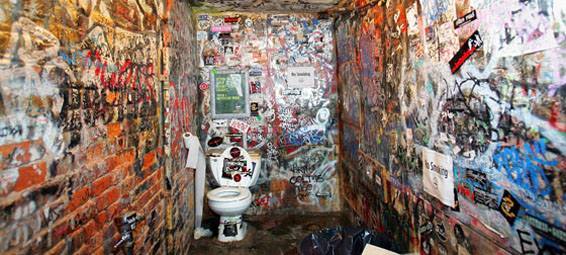Tell me if this sounds familiar. You are at a music club, swilling beer and absorbing the tides of beats and caterwauls from the stage. The drinks run their course, so you excuse yourself to the restroom. As you complete your business, you turn to leave and see, to your great astonishment, a sharply dressed man waiting with a towel, a stick of gum and a spritz of cologne.
When I saw my first rock club bathroom attendant, at the Loft in Dallas, I had such a sudden and revolting turn of paradigms. I immediately knew what had happened, that someone had deposited this luxury inside a music venue under the careless assumption that it was simply an improvement. I knew that it was being disseminated throughout rockdom for the rest of us to suffer permanently. Moreover, I knew that everyone else probably welcomed it. For my part, I dealt with two immediate questions. First, how was I going to dodge this man whose services I did not want and leave without tipping? Second, exactly how did we arrive here and what does this mean for the sanctity of rock and roll if it exists at all?
Rock and roll has its roots in the rocking and reeling of the Southern church, where men and women lost their heads in the spirit. The earthy, more sensual byproduct of that abandon continued in dusty juke joints. The people entered them under the eager proposition of mitigating their weary livelihoods with dance and sound. Their shirts clung to their bodies in shiny folds of perspiration, sweat beading on their temples. Inside them, grizzled bluesmen made magnificent sounds out of the most rudimentary of elements: a rusted string, a scarred throat.
Since then, rock and roll has carried on a proud history of meekness, being pushed to the corners and closets of society, the murky places that our modern empires tend to abandon. Rock and roll has endured on and for the margins. When it calls, it gets its response from the beggarly. It can find fertile ground in no other place.
Noted academic and syllable wizard Cornel West says that music is at its purist when it is about the funk. And by funk, he means exactly that biological soup we all crawled out of at birth. What a man or a woman holds in common with the rest is that each is “a featherless two-legged linguistically conscious creature born between urine and feces,” West says. Music lives in our biology, it is an embodied expression. West goes on to describe the musician’s role in it:
“They get us to dancing and laughing, rapping and exposing the hypocrisy of a soulless and sanitized civilization. Bluesmen aren’t sanitized. Bluesmen aren’t deodorized. Bluesmen are funky. Bluesmen got soul. “
That ethos may be at the epicenter of why I looked upon a bathroom attendant as a harbinger of ill times, of people trying to sanitize themselves out of reality in one of the few sanctuaries where truth-telling and the mess and the funk are supposed to live purposively.
Theron Rodriguez, production manager of The Loft, admits that the luxury of a bathroom attendant can be somewhat incongruous in his own club. “It’s not always the right crowd, not always appropriate,” Rodriguez says. He has also observed the humorous lengths to which empty-pocketed patrons will go to avoid tipping. “Some people just won’t wash their hands.”
Rock and roll has a long, uncomfortable history with the capital that undergirds its existence. Without market on some level, the rationale goes, we are deprived of the music at all. And if rock and roll needs a market, then it needs all the trappings of making customers happy. But if that level of pragmatism is allowed to run its extreme course, rock and roll’s subversiveness becomes a kind of stilted play-acting, like a falsely distressed piece of furniture from Pottery Barn. We can pretend it washed up on a battered shore for our discovery when it’s really just a brand new and fashionably abused status symbol. Music, where it really occurs, is not like this. Its scars are real. It invites us to dig our fingers into its fleshy ditches and discover the realness for ourselves.
The man at the sink assisting me with the liquid soap is not necessarily the issue. As Theron Rodriguez pointed out to me, the bathroom attendant at The Loft is a freelance operator who works for tips. But it is another intriguing wrinkle in a culture that is becoming progressively more comfortable with luxury — further, in a city that marches toward the front of the entitlement parade.
The compromised versions of music performance and consumption will never derail rock and roll, the blues-born art that always manages to outmaneuver and outpace our weak attempts to corral it. But sounder philosophy says you won’t find it germinating in places with flat-screens, bartender uniforms and post-urinal cologne options, but rather in the mustier crannies that harmonize with its genesis.
Image: The toilet at the late CBGB (via The Worley Gig).





